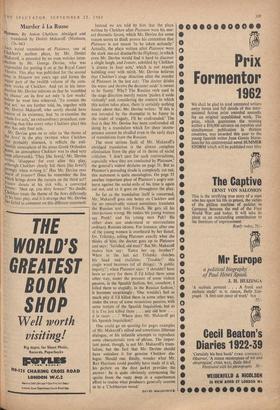Murder a La Russe
Tins weird translation of Platonov, one of Chekhov's earliest plays, by Mr. Dmitri lvfakaroff, is preceded by an even weirder intro- duction by Mr. George Devine, who was responsible for putting it on at the Royal Court Theatre. This play was published for the second time in Moscow ten years ago and forms the major part of the twelfth volume of the corn- Diele works of Chekhov. And yet in his intro- duction Mr. Devine informs us that he 'stumbled by chance' on its first act only 'a few weeks' before he went into rehearsal. 'To contain the lirst act,' we are further told, he, together with ,‘11'. Dmitri Makaroff, who surely should have "flown of its existence, had 'to re-examine the whole five acts,' an extraordinary procedure, con- sidering that. (like every other Chekhov play) this play has only four acts. Mr. Devine goes on to refer to 'the theme of the Jews' in the play (written when Chekhov Was probably nineteen, it reflects the anti- Semitic atmosphere of his pious Greek Orthodox an atmosphere Chekhov was to shed very uuti afterwards). 'They [the Jews],' .Mr. Devine writes, 'disappear for ever after this play, although Chekhov clearly felt them [the Jews?] strongly when writing it.' Has Mr. Devine ever heard of lvanov? Does he remember the line \,Thielt brings down the curtain on the third act? !,vanov shouts at his sick wife, a converted Jewess: 'Shut up, you dirty Jewess!' No doubt,
bekhov treats the theme of the Jews differently has his later play, and it is strange that Mr. Devine "as failed to comment on this different treatment.
Instead we are told by him that the plays written by Chekhov after Platonov were his one- act dramatic farces, which Mr. Devine for some reason seems to think proves his contention that Platonov is not meant `to be taken seriously.' Actually, the plays written after Platonov were the stark one-act dramaOn the Ilighway,in which even Mr. Devine would find it hard to discover a single laugh, and Ivanov, subtitled by Chekhov 'a drama in four acts,' which is not exactly bubbling over with mirth. Mr. Devine believes that Chekhov's stage direction after the murder of Platonov in the last act: 'The doctor drinks the water and throws the decanter aside' is meant to be 'funny.' Why? The Russian verb used in the stage direction merely means 'pushes it aside violently' and, considering the context in which this action takes place, there is certainly nothing funny about that. Mr. Devine writes: 'If this is not intended by the dramatist to be funny in the midst of tragedy, I'll be confounded.' The fact is that Mr. Devine has been confounded all along by a translation which for sheer incom- petence cannot be rivalled even in the early days of translations from the Russian.
The most serious fault of Mr. Makaroff's abridged translation is the almost complete elimination from the play of its theme of social criticism. don't care for such conversations, especially when they are conducted by Platonov,' the general's widow declares on page 31. But as Platonov's preceding tirade is completely cut out, this statement is quite meaningless. On page 35 another important piece of Platonov's angry out- burst against the social evils of his time is again cut out, and so it goes on throughout the play.
So far as the translation itself is concerned, Mr. Makaroff goes one better on Chekhov and for no conceivable reason sometimes translates the Russian text into French. He gets all his interjections wrong. He makes his young women say Pooh! and his young men Pah! He either does not understand or mistranslates ordinary Russian idioms. For instance, after one of the young women is overheard by her fiancd, Dr. Triletsky, telling Platonov exactly what she thinks of him, the doctor goes up to Platonov and says: 'Satisfied, old man?' But Mr. Makaroff makes him say: 'Eaten her up, brother?' When in the last act Triletsky clutches his head and exclaims: 'Trouble!' this single word becomes (of all things): 'A public inquiry !'; when Platonov says: 'I shouldn't have been so sorry for them if I'd killed them some other way, under the pressure of some violent passion, in the Spanish fashion, but, somehow, I killed them so stupidly, in the Russian fashion,' it becomes surprisingly: 'One wouldn't feel so much pity if I'd killed them in some other way, under the sway of some monstrous passion, with some torture of the Spanish Inquisition, but as it is I've just killed them . . . any old how . . . a la russe. . . .' Where does Mr. Makaroff get his Spanish Inquisition?
One could go on quoting for pages examples of Mr. Makaroff's stilted and sometimes illiterate dialogue, or his infantile attempts to reproduce some characteristic turn of phrase. The impor- tant point, though, is not Mr. Makaroff's trans- lation, but the fact that Mr. Devine should have mistaken it for genuine Chekhov dia- logue. Should one, finally, wonder what Mr. Rex Harrison could possibly have made of it all, his picture on the dust jacket provides the answer: he is quite obviously summoning the spirits from the vasty deep in a superhuman effort to realise what producers generally assume to be a `Chekhovian mood.'
DAVID MAGARSHACIC










































 Previous page
Previous page